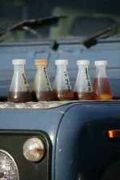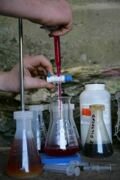How to make your own Biodiesel
Dates Available
 This course is led by Dick Strawbridge.
This course is led by Dick Strawbridge.
About this course: If you’re interested in running your diesel vehicle on biodiesel and want to learn how to make it at home then this is the course for you. Dick Strawbridge will lead you step by step through the process of making biodiesel from waste vegetable oil. The course caters for all levels of ability so it doesn’t matter if you’re unfamiliar with the workings of an engine or a seasoned grease-monkey, by the end of the day you’re going to have the confidence to conduct titrations and turn out high grade biodiesel.
 The day begins with theory, but in digestible form. Firstly Dick will explain how a diesel engine works, what biodiesel is, how it’s different from vegetable oil, and how it rates performance wise compared to regular diesel. Then he’ll talk through the chemicals that are used in making biodiesel, how it’s produced, and what the pitfalls, problems and safety issues are.
The day begins with theory, but in digestible form. Firstly Dick will explain how a diesel engine works, what biodiesel is, how it’s different from vegetable oil, and how it rates performance wise compared to regular diesel. Then he’ll talk through the chemicals that are used in making biodiesel, how it’s produced, and what the pitfalls, problems and safety issues are.
 Then it’s time for you to get hands on and actually make some biodiesel. Dick will demonstrate the process every step of the way: filtering and cleaning, titrations, warming and adding a catalyst, drying. As well as seeing how the Newhouse Farm reactors work, you’ll also get to make your own mini-batch of biodiesel to take home with you.
Then it’s time for you to get hands on and actually make some biodiesel. Dick will demonstrate the process every step of the way: filtering and cleaning, titrations, warming and adding a catalyst, drying. As well as seeing how the Newhouse Farm reactors work, you’ll also get to make your own mini-batch of biodiesel to take home with you.
Dick will explain the design of the biodiesel reactors at Newhouse Farm and describe how to make your own for very little cost. He’ll also discuss The Environment Agency and their outlines on Biodiesel production. You’ll also get the opportunity to learn about the other systems at the farm, such as the solar pv & solar thermal, water power and wind power. Before the end of the day there’ll be a question and answer session and an opportunity to discuss individual projects.
Quotes from previous attendees:
"Brilliant! Dick's style of teaching was friendly and bold, practical and welcoming with a genuine desire to empower knowledge. The course contained useable chemistry with every step explained - from the raw waste materials, the chemicals, quantities and formulae required and the importance of exact measurements and safety through to the final refined product. It also gave a really useful overview on how engines work, petrol vs diesel, building the reactor, and gave me a real sense of creation when working with this particular product. A fascinating highlight of the 3 days I spent at Newhouse Farm." James Blanchard
 Lunch: You will be invited to join us for an organic and tasty Newhouse Farm lunch. Onmivores, vegetarians, vegans… everyone is catered for and we’ll guarantee there’ll be more than enough food to satisfy even the heartiest of appetites! Local ales, organic wines and cordials are also on offer. Lunch time is always a good opportunity to fire questions at Dick and get to meet the rest of the Newhouse Farm team.
Lunch: You will be invited to join us for an organic and tasty Newhouse Farm lunch. Onmivores, vegetarians, vegans… everyone is catered for and we’ll guarantee there’ll be more than enough food to satisfy even the heartiest of appetites! Local ales, organic wines and cordials are also on offer. Lunch time is always a good opportunity to fire questions at Dick and get to meet the rest of the Newhouse Farm team.
Booking: If you'd like to book one of the dates above please to register your interest. Payment details will be forwarded if an applicant is given a place. Full payment is required 21 days before the course date.
Price: Course prices are £165 (inc VAT).
In an attempt to make the course available to people on lower incomes, we offer a limited number of concessions. To apply for a concession please at [email protected]
Transport:
The course is held at Newhouse Farm in Cornwall. Full directions will be provided once payment has been cleared. We are a short distance from the local train station; transport can be arranged if necessary.
Accommodation:
New for 2010, why not stay at Newhouse Farm in Holly's beautiful gypsy caravan? Visit www.gypsycaravanscornwall.co.uk for more information and to check availability. Alternative details of B&Bs in the village will be provided upon booking.
Newhouse Farm Course days are typically organised as follows:
|
Time |
Activity |
|
0930 - 1000 |
Course meets with organic tea, coffee and nibbles |
|
1000 - 1230 |
Introduction, theory (!), and practical demonstrations |
|
1230 - 1330 |
Lunch break - you are invited to join us. We are never sure how many people will be there - long arms are an advantage! |
|
1330 - 1630 |
More theory and practical work |
|
1630 - 1730 |
Tea, coffee and more nibbles - an opportunity to discuss individual projects. |
|
1730 ish |
Course disperses |


